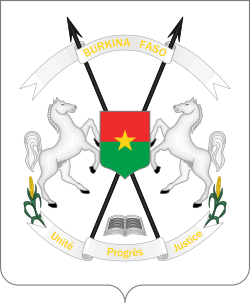2002 Burkinabé parliamentary election
Parliamentary elections were held in Burkina Faso on 5 May 2002. The result was a victory for the ruling Congress for Democracy and Progress (CDP), which won and 57 of the 111 seats in the National Assembly.
 |
|---|
| This article is part of a series on the politics and government of Burkina Faso |
|
Parliament
|
|
Administrative divisions |
|
|
|
Electoral system
Following electoral reforms introduced since the 1997 elections, the 111 members of the National Assembly were elected in two sections; 90 seats were elected using regional lists in 13 constituencies, whilst the remaining 21 were elected on a national list.[1]
Campaign
A total of 3,540 candidates registered to contest the elections, with 30 political parties participating.[1]
Results
| Party | Votes | % | Seats | |||
|---|---|---|---|---|---|---|
| National | Regional | Total | +/– | |||
| Congress for Democracy and Progress | 862,119 | 49.52 | 11 | 46 | 57 | –44 |
| Alliance for Democracy and Federation – African Democratic Rally | 219,543 | 12.61 | 3 | 14 | 17 | +13 |
| Party for Democracy and Progress / Socialist Party | 122,100 | 7.02 | 2 | 8 | 10 | +4 |
| African Independence Party (Touré) | 63,031 | 3.62 | 1 | 4 | 5 | New |
| Coalition of Democratic Forces | 61,936 | 3.56 | 1 | 4 | 5 | 0 |
| National Rebirth Party | 47,477 | 2.73 | 1 | 3 | 4 | New |
| Sankarist Pan-African Convention | 45,745 | 2.63 | 1 | 2 | 3 | 0 |
| Union for Rebirth / Sankarist Movement | 42,599 | 2.45 | 1 | 2 | 3 | New |
| Party for Democracy and Socialism | 37,836 | 2.17 | 0 | 2 | 2 | 0 |
| National Convention of Progressive Democrats | 34,379 | 1.97 | 0 | 2 | 2 | New |
| Patriotic Front for Change | 16,852 | 0.97 | 0 | 1 | 1 | New |
| Union of Democrats and Independent Progressives | 14,438 | 0.83 | 0 | 1 | 1 | New |
| Alliance for Progress and Freedom | 6,637 | 0.38 | 0 | 1 | 1 | New |
| Other parties | 166,345 | 9.55 | 0 | 0 | 0 | – |
| Invalid/blank votes | 142,243 | – | – | – | – | – |
| Total | 1,883,280 | 100 | 21 | 90 | 111 | 0 |
| Registered voters/turnout | 2,673,185 | 70.4 | – | – | – | – |
| Source: IDEA | ||||||
Aftermath
Following the elections, Roch Marc Christian Kaboré of the CDP was elected President of the National Assembly, defeating Marlène Zebango of the Alliance for Democracy and Federation – African Democratic Rally by a vote of 77–22.[1]
References
- Augustin Loada & Carlos Santiso Landmark elections in Burkina Faso: Towards democratic maturity? International IDEA